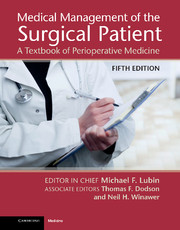Book contents
- Frontmatter
- Dedication
- Contents
- List of Contributors
- Preface
- Introduction
- Part 1 Perioperative Care of the Surgical Patient
- Section 1 General
- Section 2 Cardiology
- Chapter 9 Cardiovascular disease
- Chapter 10 Postoperative chest pain and shortness of breath
- Section 3 Hypertension
- Section 4 Pulmonary
- Section 5 Gastroenterology
- Section 6 Hematology
- Section 7 Infectious disease
- Section 8 Renal disease
- Section 9 Endocrinology
- Section 10 Rheumatology
- Section 11 Neurology
- Section 12 Surgery in the Elderly
- Section 13 Obesity
- Section 14 Transplantation
- Section 15 Psychiatric Disorders
- Section 16 Peripartum Patients
- Part 2 Surgical Procedures and their Complications
- Index
Chapter 9 - Cardiovascular disease
from Section 2 - Cardiology
Published online by Cambridge University Press: 05 September 2013
- Frontmatter
- Dedication
- Contents
- List of Contributors
- Preface
- Introduction
- Part 1 Perioperative Care of the Surgical Patient
- Section 1 General
- Section 2 Cardiology
- Chapter 9 Cardiovascular disease
- Chapter 10 Postoperative chest pain and shortness of breath
- Section 3 Hypertension
- Section 4 Pulmonary
- Section 5 Gastroenterology
- Section 6 Hematology
- Section 7 Infectious disease
- Section 8 Renal disease
- Section 9 Endocrinology
- Section 10 Rheumatology
- Section 11 Neurology
- Section 12 Surgery in the Elderly
- Section 13 Obesity
- Section 14 Transplantation
- Section 15 Psychiatric Disorders
- Section 16 Peripartum Patients
- Part 2 Surgical Procedures and their Complications
- Index
Summary
The number of non-cardiac surgeries in patients with cardiovascular diseases has been steadily rising. As perioperative myocardial infarctions are the leading cause of death after anesthesia and surgery, it is not surprising that patients with coronary artery disease (CAD) have an increased risk of perioperative morbidity and mortality. Therefore, the determination of cardiac risk generally implies a determination of “coronary risk.” Although this is suitable for the vast majority of cases due to the high prevalence of CAD, other cardiac conditions, such as heart failure, arrhythmias, valvular disease, and congenital heart disease, also increase perioperative complications and require distinct perioperative management.
A team approach to patients with cardiovascular disease who undergo non-cardiac surgery is the ideal way to expedite perioperative care. It is essential to assess patients’ risk of cardiac complications and to identify those risk factors that may be reversed or ameliorated if time allows before surgery. The most likely cardiovascular problems that patients may encounter in the perioperative period should also be anticipated and an approach to these problems planned in advance. For the patient who undergoes surgery on an emergency basis, preoperative evaluation may be limited to those components that are critical and essential for the surgical procedure. In these circumstances the consultant may well perform a more detailed evaluation in the postoperative period. For many patients the preoperative evaluation is their only opportunity for medical assessment. The consultant should bear this in mind and consider the preoperative evaluation visit as an opportunity for assessment of general cardiovascular risk and development of a plan for cardiac risk reduction.
- Type
- Chapter
- Information
- Medical Management of the Surgical PatientA Textbook of Perioperative Medicine, pp. 75 - 112Publisher: Cambridge University PressPrint publication year: 2013

